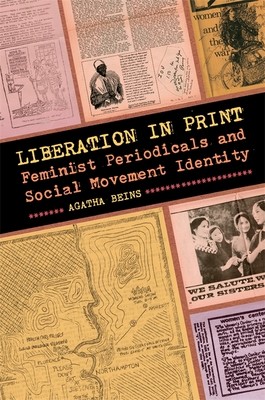
- We will send in 10–14 business days.
- Author: Agatha Beins
- Publisher: University of Georgia Press
- ISBN-10: 0820349518
- ISBN-13: 9780820349510
- Format: 15.2 x 22.9 x 1.6 cm, hardcover
- Language: English
- SAVE -10% with code: EXTRA
Reviews
Description
This is the first analysis of periodicals key role in U.S. feminism s formation as a collective identity and set of political practices in the 1970s. Between 1968 and 1973, more than five hundred different feminist newsletters and newspapers were published in the United States. Agatha Beins shows that the repetition of certain ideas in these periodicals ideas about gender, race, solidarity, and politics solidified their centrality to feminism.
Beins focuses on five periodicals of that era, comprising almost three hundred different issues: Distaff (New Orleans, Louisiana); Valley Women s Center Newsletter (Northampton, Massachusetts); Female Liberation Newsletter (Cambridge, Massachusetts); Ain t I a Woman? (Iowa City, Iowa); and L.A. Women s Liberation Newsletter, later published as Sister (Los Angeles, California). Together they represent a wide geographic range, including some understudied sites of feminism. Beins examines the discourse of sisterhood, images of women of color, feminist publishing practices, and the production of feminist spaces to demonstrate how repetition shaped dominant themes of feminism s collective identity. Beins also illustrates how local context affected the manifestation of ideas or political values, revealing the complexity and diversity within feminism.
With much to say about the study of social movements in general, Liberation in Print shows feminism to be a dynamic and constantly emerging identity that has grown, in part, out of a tension between ideological coherence and diversity. Beins s investigation of repetition offers an innovative approach to analyzing collective identity formation, and her book points to the significance of print culture in activist organizing.
"
EXTRA 10 % discount with code: EXTRA
The promotion ends in 18d.22:17:27
The discount code is valid when purchasing from 10 €. Discounts do not stack.
- Author: Agatha Beins
- Publisher: University of Georgia Press
- ISBN-10: 0820349518
- ISBN-13: 9780820349510
- Format: 15.2 x 22.9 x 1.6 cm, hardcover
- Language: English English
This is the first analysis of periodicals key role in U.S. feminism s formation as a collective identity and set of political practices in the 1970s. Between 1968 and 1973, more than five hundred different feminist newsletters and newspapers were published in the United States. Agatha Beins shows that the repetition of certain ideas in these periodicals ideas about gender, race, solidarity, and politics solidified their centrality to feminism.
Beins focuses on five periodicals of that era, comprising almost three hundred different issues: Distaff (New Orleans, Louisiana); Valley Women s Center Newsletter (Northampton, Massachusetts); Female Liberation Newsletter (Cambridge, Massachusetts); Ain t I a Woman? (Iowa City, Iowa); and L.A. Women s Liberation Newsletter, later published as Sister (Los Angeles, California). Together they represent a wide geographic range, including some understudied sites of feminism. Beins examines the discourse of sisterhood, images of women of color, feminist publishing practices, and the production of feminist spaces to demonstrate how repetition shaped dominant themes of feminism s collective identity. Beins also illustrates how local context affected the manifestation of ideas or political values, revealing the complexity and diversity within feminism.
With much to say about the study of social movements in general, Liberation in Print shows feminism to be a dynamic and constantly emerging identity that has grown, in part, out of a tension between ideological coherence and diversity. Beins s investigation of repetition offers an innovative approach to analyzing collective identity formation, and her book points to the significance of print culture in activist organizing.
"


Reviews